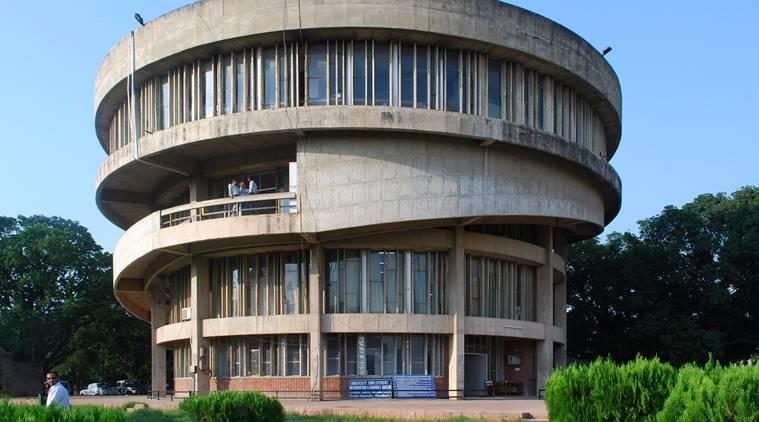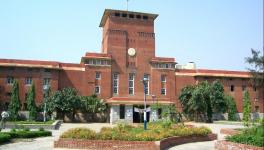‘Will Not Allow Centralisation of Panjab University’: Students Organisations After High Court Remark

Image Courtesy: The Indian Express
The students and other civic organisations in Punjab are up in arms against the remark made by Punjab and Haryana High Court about taking over Panjab University to facilitate uniformity in employment and salary rules. The court was listening to the plea of Panjab University teachers to extend the retirement age from 60 to 65 after the Centre introduced central service rules for employees of Chandigarh Union Territory. The court sought a response from the Centre till August 30.
However, student organisations have termed the remark an assault on federalism and bid to exert more centralisation by the Modi Government deploying the New Education Policy (NEP). They have also called for a bigger agitation on June 8 to press on the issue.
Calling it a move to reject Punjab’s claim on Chandigarh, Students for Society, one of the most prominent students’ organisations, said that Chandigarh employees have already been brought under central service rules and PU teachers want the same benefits.
For pushing the central university status, the Court argued that the Punjab government does not pay its share, and the central status would bring more funding.
It said, “We need to understand that the central government has already snatched all major financial powers of the states, and GST was the last straw in centre-state relations. After virtually converting states into mere municipalities, now even the centralisation of institutions is being pushed. On the contrary, this centralisation must be reversed, and financial powers like that of GST must be given back to states to implement decentralisation of power and institutions. If this over-centralisation spree is not checked, this fallacious argument of centralisation would be extended to convert states into UTs as states will not have funds.”
Panjab University was established in 1882 with its base in Lahore. When the country was partitioned, a central legislation was passed in September 1947 to bring it under the domain of the Union government. The act identified it as an inter-state university where the Union government and Punjab will share the funding and human resources in a ratio of 60:40. After the reorganisation of states, Himachal Pradesh and Haryana established their own universities to affiliate with their own colleges. However, Panjab University was not transferred to Punjab.
Over the years, the Punjab government could not release funds owing to the enormous debt crisis. The university has a unique administration structure with elected bodies of syndicate and senate being the primary decision-makers. The student groups maintain that the Centre want real control over the institutions to further its agenda of commercialisation and saffronisation.
SFS further added that the newly introduced National Education Policy (NEP) 2020 also seeks to replace all democratic structures like the senate and pushes for rapid privatisation of educational institutions through centralisation.
In a statement, it said, “The thrust of neoliberal policies is privatisation through centralisation which must be opposed by one and all. To reverse the neoliberal (commercialised) universities, centralisation must be opposed. Instead of advocating central status, the need is to pressurise Punjab Govt to take up more financial responsibility (which again will require more finances in the hands of States).”
“The high court judge, while directing the central government, duly acknowledges the less say of Punjab in PU, which is limited to affiliated colleges and financial contribution. Whereas it put blind eyes on the senate regarding Punjab’s decision-making participation, it instead passes arbitrary statements and seeks its restructuring. The remarks of the High Court judge are in line with NEP 2020, which seeks to replace the senate with a Board of Governors and a High-Level Committee formed by the Vice-President with the goal of undermining Punjab’s claims by removing elected members from the senate under the guise of governance reform,” the statement added.
Other student groups, too, have mobilised against the remark and decided to stage a protest on June 8 in Chandigarh. Amrit Pal from the Students Federation of India Punjabi University, Patiala, told NewsClick over the phone that if the Centre takes over the university, the affiliate colleges of Punjab will be without any university.
He said, “Even though BJP could appoint vice-chancellor, he cannot take such decisions without the approval of syndicate and senate. The real problem is centralisation through which it wishes to appoint its men into faculty and other administrative structures. We held our meeting with other groups and will go to Chandigarh to express our resentment.”
Balwinder Singh Tiwana, retired Professor of Economics from Punjabi University, said that the issue could be resolved with the active participation of the State government. Talking to NewsClick over the phone, he said, “If Rajasthan can bring uniformity in employment rules, why cannot Punjab? Moreover, the real issues are centralisation and consistent curtailment of funds to the state. Tamil Nadu and Kerala have already raised the issues. Centre cut allocations, and states slipped in debts. Just look at the example of cess and surcharge on petroleum products. It has been increasing cess and surcharges, not excise duty because it will not be shared with states.”
Tiwana added: “The second example could be stopping special assistance grants from the university grants commission for four years. Punjab fought a difficult battle with militancy for fifteen years. It was the nation’s fight, but Punjab paid the bill. Why? West Bengal and Tamil Nadu have already passed legislation to make chief ministers chancellors, not governors, only because governors are unnecessarily meddling with states’ affairs.”
Get the latest reports & analysis with people's perspective on Protests, movements & deep analytical videos, discussions of the current affairs in your Telegram app. Subscribe to NewsClick's Telegram channel & get Real-Time updates on stories, as they get published on our website.
























